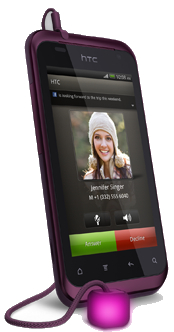HTC Rhyme: Android phone that offends target market


I received the HTC Rhyme a few days ago and it is the first phone I have evaluated that leaves me shaking my head. It is an attractive handset much like other HTC phones, and it has little to set it apart from the HTC Android line. The difference is in the accessories included with the phone that are clearly aimed at women buyers. Rather than review the Rhyme myself, I feel it is more appropriate to share the feedback I have received from those in the target market.
The Rhyme ships in an unusual metallic purple, that is attractive. The specifications are nothing special, a 3.7-inch display, 1 GHz single-core processor, and a microSD slot to allow augmenting the 4GB of memory on the phone. The more I look at the Rhyme the more it reminds me of the HTC Hero from a while back.
What sets the Rhyme apart from the Android crowd, and determines the target market for the phone, are the accessories in the box. In addition to the phone there is a standard tiny power brick and cable for charging, a matching purple wired stereo headset, a wired "charm", and a charging dock.
The dock is designed to sit on a desk or table and interact with the phone in landscape orientation while it is being charged. The phone must be set in the dock just right or it doesn't charge, but it's not hard to get it lined up.
The wired headset is a good quality pair of audio earplugs with a microphone integrated for use as a hands-free headset. It matches the purple color of the Rhyme, an obvious effort to make it an accessory for the phone.
The charm, as HTC is calling it, is something never seen in the smartphone world prior to the Rhyme. It is a wire with a purple cube on the end, designed to signal the owner when a call has been missed. The charm plugs into the 3.5mm audio jack on the phone, which activates the purple LED notifications. The idea is the phone can be thrown into a bag, and the charm can be left dangling out so notifications won't be missed. The purple cube flashes when a call comes in or is missed, until the notification is cleared on the phone.
This charm alone tags the Rhyme as a phone for women, but along with the matching audio headset there is little doubt. It is obvious that HTC wants the Rhyme to appeal to women, but given the reactions to the phone I have seen I think HTC needed to think this through further prior to release.
The first person I handed the Rhyme was my wife, who sees a lot of phones through my work. I would class her as a typical consumer, not too concerned about the technical aspects of a handset, rather if it does what she needs.
She liked the color of the Rhyme, and thought the phone fit nicely in the hand. Things went down from there when I demonstrated the charm, and the realization hit that this phone was "for women".
"What, are women not SMART enough for a regular phone? Does the company think we need special phones because we can't figure out how to work "regular" ones?"
"And what's with the WIRED headset? Who uses those anymore? Are we women not SMART enough to use a Bluetooth headset? Or does this phone not connect over Bluetooth to my car for hands-free use?"
"That charm is the stupidest thing I have ever seen for a phone. That's another thing to get all tangled up in my purse, eventually to break. And I still have to take the phone out to answer or make a call, so what's the point?"
She handed me the Rhyme back at that point, and had no desire to try it again. I got a similar reaction from every woman I showed the phone. Anger that women needed "special" phones, and disbelief at how poorly thought out the accessories were designed.
HTC is trying to create products that stand out from the crowded Android phones out everywhere, but it missed the mark with the Rhyme on every level.